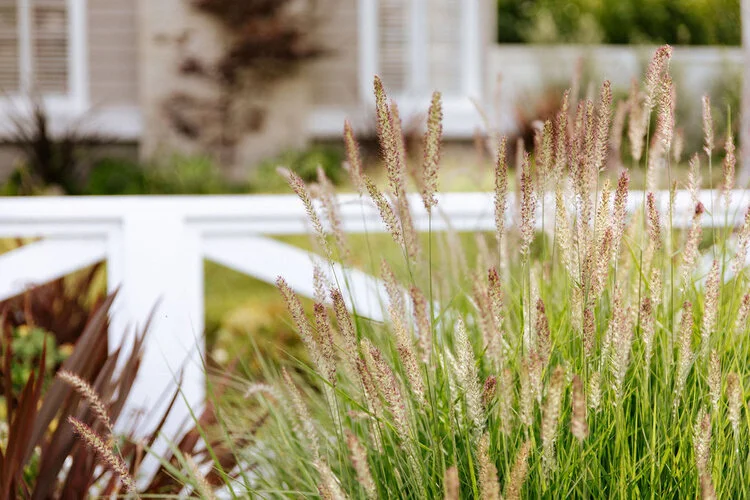Design by Sacha McCrae. Photo by Brett Hilton.
APLD CA Chapter’s Advocacy Initiatives
Through the Chapter’s Advocacy Committee (previously Advocacy & Sustainability Task Force), APLD members advocate for many important causes that impact our members, profession, environment, and issues with respect to equity and justice. The Committee has been actively working on two identified priorities relative to environment: Fire-resilient Landscape Design and Biodiversity (Native Habitat Garden Design).
The Committee recognizes that increasing wildfire danger throughout the state has made it urgent that California’s design professionals receive comprehensive, standardized, science-based education so that solutions for meeting a resident’s needs and expectations can be melded with strategies that will reduce the very real threat that the landscapes around a home can pose. This education will enable landscape designers to play an important role in helping design fire-resilient landscapes that promote and protect biodiversity.
Fire-resilient Landscape Design Initiative
Join Us for This
Virtual Symposium
November 4, 2021, 2:00 to 5:30 p.m.
Fire-resilient Landscapes: Creating Beautiful Gardens for Defensible Space
Landscape design and photo by Shireen Zia. Landscape installation by EarthCare Landscaping.
Cheryl Miller, RLA, and Carol Rice, Fire Ecologist, will present design principles that help provide resiliency in the face of a wildfire. Richard Halsey, Director of the Chaparral Institute, and Mike Evans, Founder and President of the Tree of Life Nursery, will provide useful information on plants for improving habitat conservation, biodiversity, soil stability, increasing carbon storage, and enhancing water conservation. These tools will aid designers in creating gardens with aesthetic appeal that help protect homes.
The Advocacy Committee’s Education Working Group has established the Fire-resilient Landscape Design Initiative and will develop a comprehensive qualification training program to better prepare our designers for the wildfire reality that California landscapes face.
Biodiversity Initiative
The Education Working Group has also established the Biodiversity Initiative, which will focus on researching and developing a science-based curriculum to educate designers about how to create water-wise habitat gardens with a focus on native plants, water conservation, water harvesting, soil health, and carbon storage in a way that will regenerate biodiversity. Because of habitat loss related to development, climate change, and wildfires, there is a growing need for gardens that attract and support wildlife, especially pollinators, butterflies, and hummingbirds. The good news is that when gardens are designed, constructed, and maintained for these beautiful biodiversity ambassadors, they benefit a wide array of other wildlife as well. We should and can be part of creating these regenerative landscapes.
Please consider how you can be involved. It is our hope that we’ve piqued your interest and that you want to learn more about these Initiatives. Please join us to help others in learning how to create gardens that are beautiful and vital for the reasons described here and more!
“Individually, we are one drop. Together, we are an ocean.”
— Ryunosuke Satoro
To get involved in one of these groups, please contact Kit Veerkamp who is coordinating both Initiatives at kitzkamp@yahoo.com.
Kit is a retired licensed landscape architect with over 40 years of experience designing residential, commercial, institutional, and public works projects throughout the greater Sacramento region and foothills. In addition to serving on the Sacramento District’s Board and the Chapter’s Advocacy Committee, she is the Horticulture Chair and Plant Sale Coordinator for the El Dorado Chapter of the California Native Plant Society, UC Master Gardener, and California Naturalist. She teaches courses on improving soils, pollinator gardens, natural pest management, water-wise gardening, habitat gardening, and fire-resiliency.
IMMEDIATE ACTION NEEDED BY ALL OUR APLD MEMBERS
Please Sign onto APLD’s Healthy Pots Healthy Planet Initiative Today!
APLD has undertaken a major, and potentially game-changing environmental effort to reduce the use of plastics in the horticultural industry. By building a huge Coalition of individuals, trade associations, non-profits, retail and wholesale nurseries and growers, we plan to create an overwhelming groundswell of pressure for manufacturers to produce more sustainable alternatives to horticultural plastic pots. This effort is not unlike the work it took to establish the ground-breaking LEED environmental standards that now are a staple in the architectural, building, and landscape construction industries.
It is critically important that each and every one of our 600 plus APLD members sign on to join this Coalition by mid-October. So far just a fraction of us have done so but I know we can turn that around. Full participation by our membership is critical for showing potential Coalition members that APLD as an organization has thrown its weight fully behind this climate change Initiative.
Toni Bailey (DC/MD/VA Chapter) is the head of the APLD’s Healthy Pots Healthy Planet Initiative Committee. The APLD California Chapter is taking a leading role on this Committee, with Karen Hunt and Lori Cox (Bay Area District members) representing us at the National level. Their work is under the umbrella of the California Chapter’s Advocacy Committee. If you would like to be involved, please email: karen@hunt106.net.
For more information, visit the HPHP website: healthypotshealthyplanet.org


